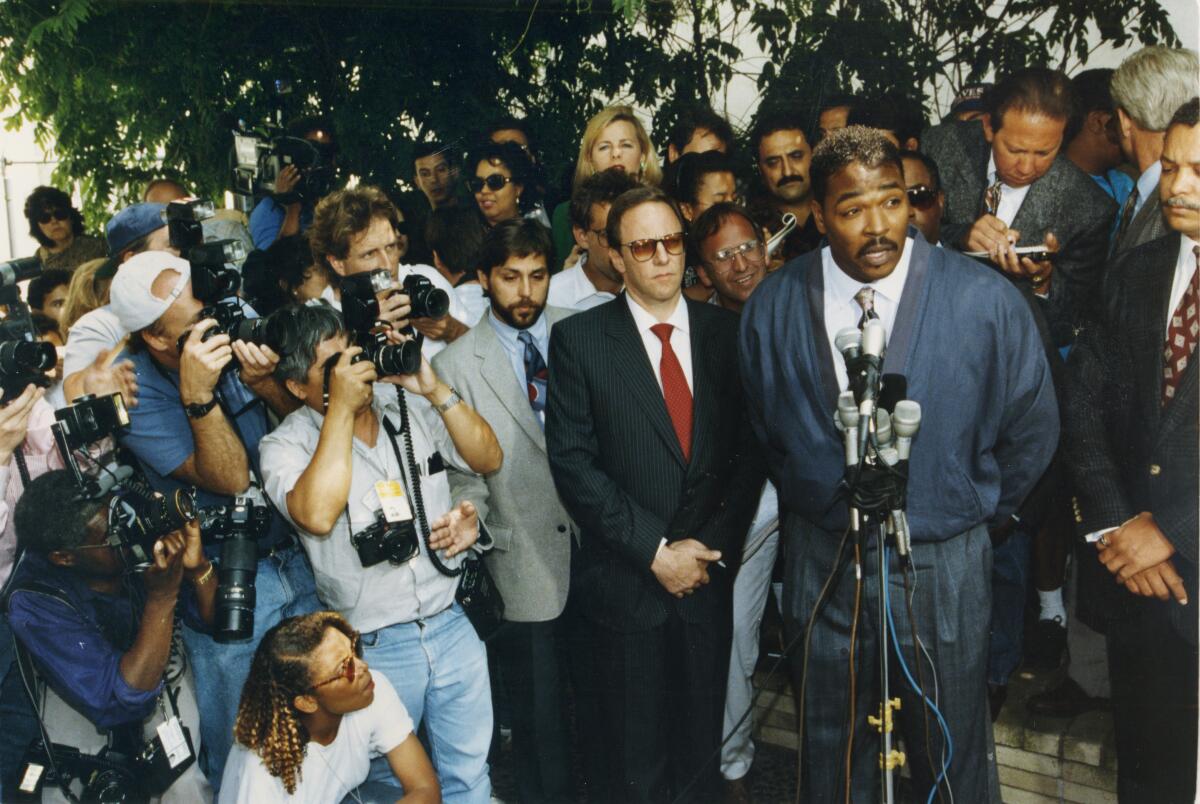What the world got wrong about Rodney King

- Share via
He was called Glen by family and friends, and that’s what I called him too, for Rodney Glen King was, indeed, a friend of mine.
Born in 1965, King came into the world just before the Watts riots and left as Barack Obama was completing his first term as America’s first Black president. Halfway through Glen’s all too short life, four Los Angeles Police Department officers beat him nearly to death while amateur video buff George Holliday captured the horror for all to see on coast-to-coast TV.
For the record:
7:47 p.m. March 3, 2021An earlier version of this article incorrectly suggested that King was handcuffed before the beating started. He was handcuffed while on the ground after the beating.
Thirty years ago, on March 3, 1991, Glen King went out drinking and driving with pals until a patrol car spotted his car speeding on the freeway and gave chase. After a short pursuit, Glen parked and climbed out of the car. Then, upon direction from Sgt. Stacey C. Koon, the officers proceeded to pummel Glen, cracking his skull and leaving him with permanent brain damage.
The rest is one of the darker chapters in L.A. history, during which most media joined law enforcement in vilifying Glen as a violent felon on PCP who probably got the beating he deserved. A year later an all-white jury in nearly all-white Simi Valley acquitted Koon and three other cops, triggering the worst race riot since Watts, when 34 people lost their lives and another 1,032 were injured. By comparison, the Rodney King uprising of 1992 cost 63 lives and 2,383 injuries. Damage from Watts came to $40 million; damage after the King verdicts, about $1 billion.
A federal court corrected part of the injustice, convicting two of the four LAPD officers for violating Glen’s civil rights in 1993. He later sued and won a $3.8-million judgment from the city.
I first met Glen a couple of years after that. Upon recommendation of a mutual acquaintance, he asked me to help him write his autobiography. Mainstream New York publishers were not interested. King was considered a thug — a drug-addled Black gangster who got a deserved beating at the hands of police. Such was the prevailing picture painted by rumor, innuendo and the press.
But I had come to know otherwise. The Rodney King I knew had been slowed by brain damage, and yet I never met a kinder, more forgiving and genuinely funny guy. He held no animosity against his attackers or the lawyers who took a big share of the settlement, or the media that misrepresented who he really was. He was human with human failings, but most of the time Glen was a living, breathing practitioner of the golden rule.
When I couldn’t sell his book, I offered instead to film his story for a documentary, and thus began a 15-year odyssey. Joining forces with producer Ira Abrams, I met with Glen off and on every year or two, picking up his story told in his own words. I met his mom, his brothers, his friends, neighbors, attorneys, girlfriends, kids … and came away amazed at how very, very wrong the world had gotten this gentle, humble man.
I do not discount his drug or alcohol abuse. His father died of boozing before Glen’s very eyes when he was still a teen. He struggled with addiction. I went to NA and AA meetings with Glen and saw firsthand how semi-celebrity and brain damage can be handicaps for recovery. I have no doubt he was self-medicating every time he picked up a doobie or a drink.
Glen survived and lived another 20 years following his confrontation with L.A.’s finest. In 2012, He succumbed to heart arrhythmia in his own swimming pool at age 47.
Nowadays, I wonder what Glen would say about the Black Lives Matter movement. It arguably began when he was still an infant. Following six days of violence in August 1965, when whole city blocks burned to the ground, Gov. Pat Brown ordered the McCone Commission to study its causes. Almost none of the recommendations in the commission’s report were implemented. After the King riots, a commission led by Warren Christopher performed a similar inquiry into the LAPD, also with very limited results.
So here we are, 30 years on, and the question Glen asked so many years ago — “Can we all get along?” — lingers still. It haunts every video shot by every cellphone user at the site of every police beating, shooting, tasing or pepper spraying in an era when hardly any news cycle ends without yet another report of white cops beating Black citizens.
When Glen made that plea to stop the riots, he also said, “We’ll get our justice. They’ve won the battle, but they haven’t won the war.”
Those words echo at the all-too-routine memorials and at the angry press conferences and courtroom rituals that follow. It remains to be seen, a generation later, whether Glen’s wish for justice will become reality for those who come after him and others like Trayvon and George and Breonna and Philando and Tamir.
Dennis McDougal, a former staff writer at the Los Angeles Times, is author of 14 books and co-producer of an upcoming documentary on the life of Rodney King.
More to Read
A cure for the common opinion
Get thought-provoking perspectives with our weekly newsletter.
You may occasionally receive promotional content from the Los Angeles Times.









